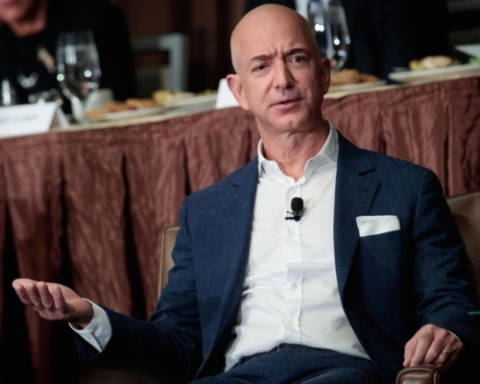Standards in the Workplace: What Jeff Bezos’ 2018 Letter to Amazon Shareholders’ Teaches Us
All managers aim to achieve high standards in the workplace. It is through these standards that your organisation satisfies its clients. Amazon CEO Jeff Bezos’ 2018 shareholders’ letter examines teachable workplace standards.
For most, Jeff Bezos is a man who needs little introduction. The CEO of Amazon, he is one of the most influential business minds on the planet. He is also an advocate of maintaining high standards in the workplace.
Each year, Bezos releases a letter to the company’s shareholders. While this letter includes all of the stats and figures that you would expect, it also includes plenty of business wisdom. Bezos uses his letters to discuss key workplace issues. In the past, he’s focused on issues such as making decisions and creating strong teams. Here are 5 leadership lessons from his 2017 shareholder letter.
In 2018, he focused on how to create high standards in the workplace. Moreover, he shows that such standards aren’t intrinsic to a person. Teachable workplace standards are the focus of his letter.
High Standards in the Workplace – Intrinsic vs. Teachable
Bezos starts his letter with a discussion. He talks about the differences between intrinsic and teachable standards.
He gives the example of bringing people into a basketball team. Bezos notes that a coach can teach somebody how to play more effectively. But a coach can’t teach somebody to be taller. That’s an intrinsic “skill” that you either have or that you don’t.
Bezos then relates this to the workplace and the idea of selecting the right people to create high standards. He says that many people believe that high standards in the workplace stem from the intrinsic standards of the person.
Bezos disputes this belief in his letter. He says:
“I believe high standards are teachable. In fact, people are pretty good at learning high standards simply through exposure. High standards are contagious.”
He argues that you can speed up the development of high standards in the workplace with a few core practices.
Core Practice #1 – Make High Standards in the Workplace Domain Specific
Firstly, Bezos examines an issue that many large organisations have to deal with. He notes that high standards in one department do not equate to high standards elsewhere.
“When I started Amazon, I had high standards on inventing, on customer care, and (thankfully) on hiring,” he says.
“But I didn’t have high standards on operational process: how to keep fixed problems fixed, how to eliminate defects at the root, how to inspect processes, and much more. I had to learn and develop high standards on all of that (my colleagues were my tutors).”
Here’s what he’s saying. Many believe that their high standards spread to all areas of their organisation. But there are usually domains in which you don’t have expertise personally. Expecting standards in your favoured domains to spread to those isn’t workable. You have to learn how to apply the right standards to each domain of your organisation.
For example, you may have expertise in the sales domain. This allows you to ensure high standards in this aspect of your organisation. But you may know little about human resources. Moreover, the standards you implement for your sales team may not mesh with those needed for human resources.
Learn the specific standards that each department of your organisation must meet. In many cases, your people can provide guidance on what these standards are. Thus, domain-specific standards are teachable workplace standards.
 Core Practice #2 – Recognise the Scope
Core Practice #2 – Recognise the Scope
Bezos expands on this with his second core practice. He notes that recognition of the practices needed to improve standards is only the first step. It’s only after identifying the scope of the issue that you can put a plan in place.
As he says: “First, you have to be able to recognise what good looks like in that domain. Second, you must have realistic expectations for how hard it should be (how much work it will take) to achieve that result – the scope.”
Bezos tells a couple of anecdotes within the letter to illustrate this point further.
The Handstand Conundrum
His first tale delivers some of the humour that we’ve come to expect from Bezos’ letters. He relates the story of a friend who’d decided that she wanted to do a perfect handstand. This meant no leaning against walls or wobbling.
At first, she consulted with her yoga coach. A little bit of practice may have helped her to achieve a result. But it wasn’t of the standard that she wanted.
That’s when she hired the services of a specialised handstand coach. The coach’s first words of advice highlight Bezos’ point about scope.
“Most people think that if they work hard, they should be able to master a handstand in about two weeks,” says the coach.
“The reality is that it takes about six months of daily practice. If you think you should be able to do it in two weeks, you’re just going to end up quitting.”
Bezos’ friend had approached her task with no recognition of its true scope. She thought a perfect handstand was something that she could achieve quickly. This meant she had unrealistic expectations. Once those expectations get shattered, she could easily have quit the endeavour.
The concept of scope relates to teachable workplace standards. To achieve the standards you desire, you must first appreciate the scope of the task ahead of you. That’s how you create effective roadmaps for achieving your goals.
The Six-Page Memos
Bezos points out that it’s easy to recognise a perfect handstand. You can either achieve it or you can’t. Moreover, you can see the results for yourself.
Business isn’t usually that simple. Bezos highlights this fact with another story about how those at Amazon share ideas.
The company does away with the slideshow presentation format that so many organisations use. Instead, Bezos asks for those with new ideas to create six-page memos. These memos follow a narrative structure that details the idea held within. All involved in a meeting read the memo prior to opening it up for discussion.
Bezos says that this is where the idea of high standards in the workplace gets a little muddier.
“The difference between a great memo and an average one is much squishier,” he says. “It would be extremely hard to write down the detailed requirements that make up a great memo.”
Nevertheless, he says that you can feel a great memo when you read it. The reader’s reaction is often enough to demonstrate that they’ve read something special. Bezos can’t create a set of steps for creating such a memo. But he notes that recognition of a challenge and appreciation of the scope plays a large part.
He says: “Often, when a memo isn’t great, it’s not the writer’s inability to recognise the high standard, but instead a wrong expectation on scope. They mistakenly believe a high-standards, six-page memo can be written in one or two days or even a few hours.”
In other words, the writer tries to achieve a perfect handstand in a couple of weeks.
Bezos points out that Amazon isn’t doing its job correctly when people create poor memos. It’s not an understanding of the standards that the writer lacks. It’s an understanding of the scope of the task ahead of them.
Bezos relates this back to teachable workplace standards. He says that there’ s a certain amount of coaching that goes into this memo creation process. This doesn’t relate directly to the content of the memo. Instead, it relates to the scope of creating a great memo.
s a certain amount of coaching that goes into this memo creation process. This doesn’t relate directly to the content of the memo. Instead, it relates to the scope of creating a great memo.
Bezos says that great memos come from constant redrafting and sharing of ideas. Amazon’s people do this when they understand the scope of the task ahead of them. A couple of hours of work won’t create an inspiring memo. But several weeks of rewrites and thought-sharing has a much better chance.
Both of these stories make the same point. One of the keys to achieving high standards in the workplace is the recognition of the true scope of a challenge.
Core Practice #3 – Understand Skills in the Context of Teams
Bezos returns to the memo anecdote when discussing the idea of skill in establishing high standards. He points to the mistaken belief that you must be a skilled writer to create a strong memo.
Bezos believes that skill plays little part in the process, particularly when it comes to recognising scope.
He says: “The football coach doesn’t need to be able to throw, and a film director doesn’t need to be able to act. But they both do need to recognise high standards for those things and teach realistic expectations on scope.”
He makes an important point here for leaders. Your skill doesn’t necessarily lie in the specific standards that your team must achieve. Instead, it must lie in recognising the scope of the challenges that the team faces in creating those standards.
It’s a subtle, but important, difference. You may not have the skill to write the memo. But somebody on your team will. Your job is to ensure the team works together to use those skills effectively. Moreover, you must establish the scope of the task to ensure that everybody in the team works towards that standard.
It’s a simple concept. Good teamwork leads to high standards. Ensure your team understand the scope of a problem. Moreover, ensure it uses its skills effectively. These are both teachable workplace standards.
You can read the full letter here.
The Final Word
The main point of Bezos’ letter is that creating high standards isn’t something that you can do alone. It requires the entire team to get on board. As a manager, your role is to help others understand how these standards apply.
This requires the following:
- Knowledge of the fact that standards differ depending on the domain. You can’t apply the standards from one department to another.
- Recognition of the scope of the challenge. High standards aren’t something that your organisation will achieve in a day or two.
- Understanding how to use your team’s skills to achieve the standard. You don’t need to have the skills directly. But a great manager must guide their people to achieve the required standard.
A Great Manager can raise the standards of an entire organisation.
Register for our next free webinar to learn what great managers do to improve standards in all departments.






